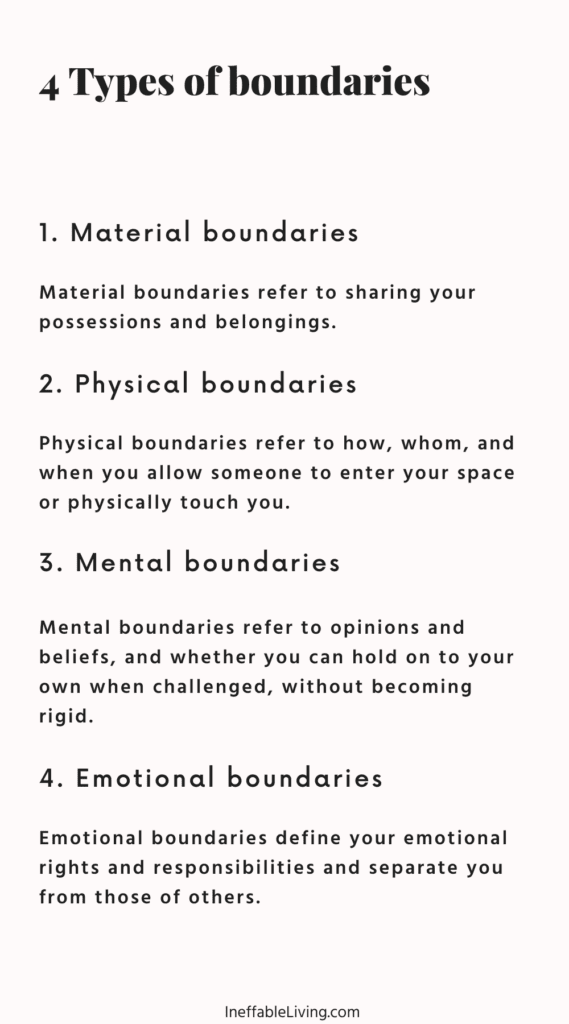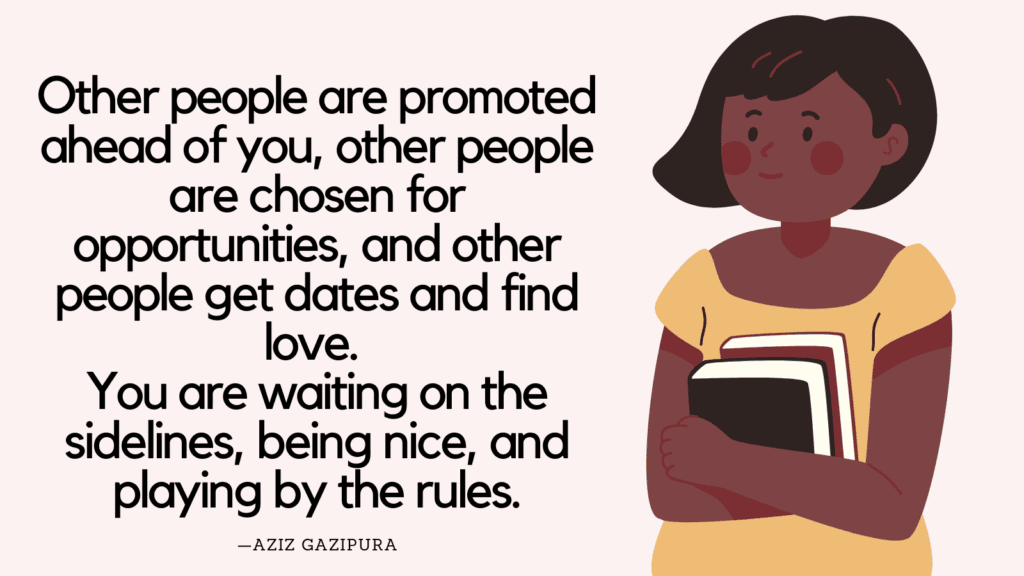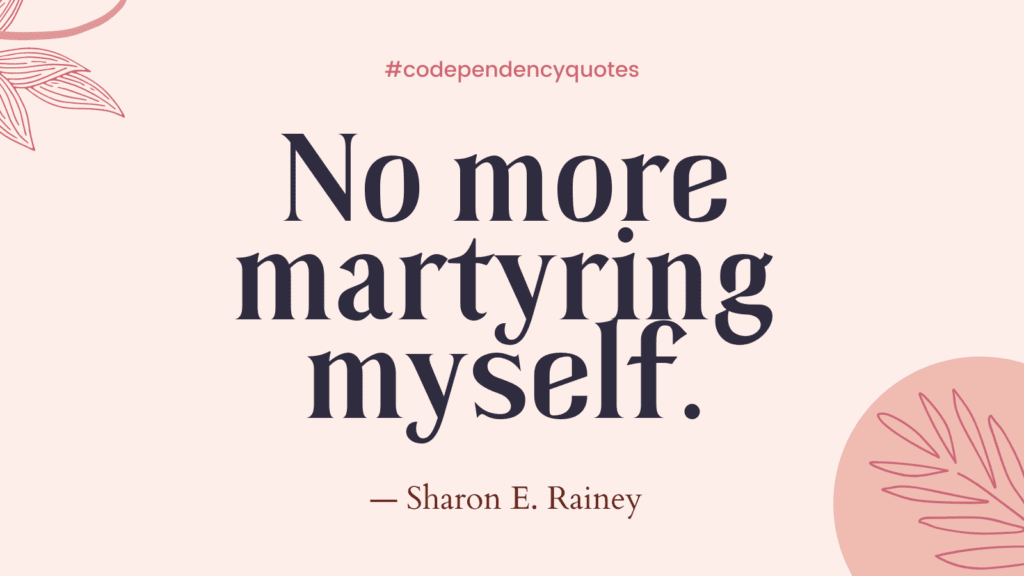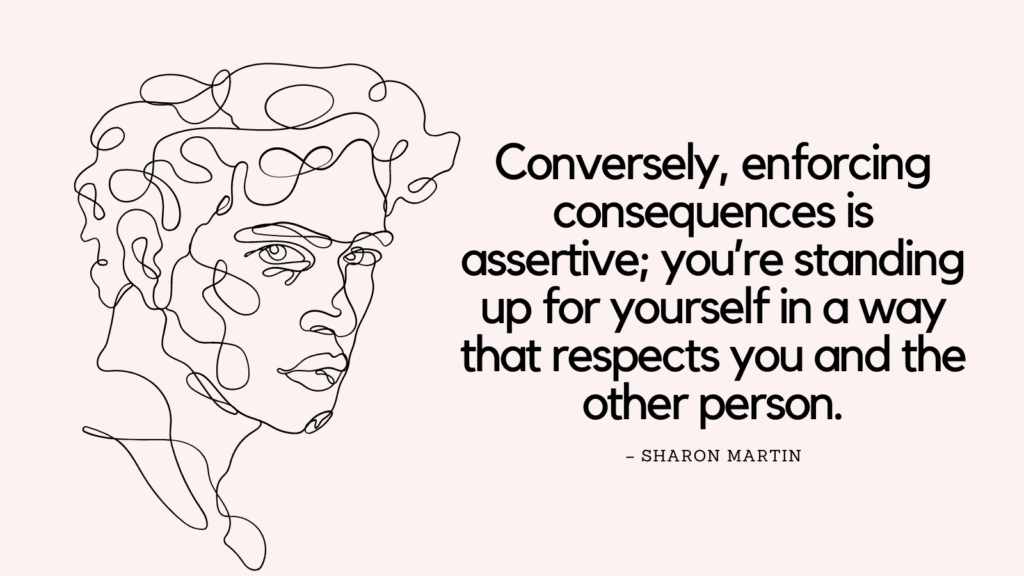This post contains some of the best tired of being nice quotes.
Tired Of Being Nice Quotes
1. “Nice Guys are frequently isolated. Though Nice Guys desire to be liked and loved, their behaviors actually make it difficult for people to get very close to them.”—Robert A. Glover
2. “Nice Guys are often attracted to people and situations that need fixing. This behavior is often the result of the Nice Guy’s childhood conditioning, his need to look good, or his quest for approval. Unfortunately, this tendency pretty much guarantees that Nice Guys will spend most of their time putting out fires and managing crises.”—Robert A. Glover
Related: Nice Guy Syndrome Test (+Best 19 Practical Strategies To Overcome The Nice Guy Syndrome)
3. “Most Nice Guys pride themselves on being honest and trustworthy. Ironically, Nice Guys are fundamentally dishonest. Nice Guys will tell lies, partial truths, and omit information if they believe it will prevent someone from focusing on them in a negative way”—Robert A. Glover
4. “Other people are promoted ahead of you, other people are chosen for opportunities, and other people get dates and find love. You are waiting on the sidelines, being nice, and playing by the rules.”—Aziz Gazipura
5. “Since Nice Guys strive so hard to be good, giving, and caring, they believe these acts should build up a credit that wipes clean any wrong they might do. Part of the Nice Guy’s belief is that if he does most things right, no one should ever notice the few things (if any) he does wrong.”—Robert A. Glover
6. “Mature people take responsibility for their actions. When they make a mistake or act inappropriately, they apologize, make amends, or repair the damage. Conversely, Nice Guys try to fix situations by doing whatever it takes to get the other person to stop being upset.”—Robert A. Glover
7. “The nice stance is inherently a passive one. It’s the path of avoidance of discomfort and hoping that life will magically turn out the way we want it to. It’s a life of fear with a thin rationalization: I’m choosing to live this way because it makes me a “good person.””—Aziz Gazipura
Related: What Do Boundaries Sound Like? + 35 Boundaries Examples
8. “To challenge those rules and change how you are in the world can stir up anxiety and guilt. I can’t become “one of those people.” Those selfish jerks and assholes who just take what they want from others and from life. And so we decide to stick to the same game, but just play it harder. Be nicer, more pleasing, more accommodating, more giving, and more polite. Eventually, this will all pay off. Eventually my time will come.”—Aziz Gazipura
9. “If someone gets angry at a Nice Guy or points out some flaw or mistake, his shame will be triggered. In an attempt to distract himself and the other person from his “badness” he may try to turn the tables and do something to trigger the other person’s shame. I call this shame dumping. This unconscious strategy is based on the belief that if the Nice Guy can shift the focus to the other person’s badness, he can slip out of the spotlight. Typical shame dumping techniques include blame, bringing up the past, deflection, and pointing out the other person’s flaws.”—Robert A. Glover
10. “Nice Guys build walls that prevent others from getting too close. Understandably, this affects their ability to be intimate, but it also protects them from the consequences of being found out. These walls might include: Addictions (food, sex, t.v., alcohol, work, etc.), humor, sarcasm, intellectualism, perfectionism, and isolation.”—Robert A. Glover
11. “As much as Nice Guys try to look good and get people to like them, the above defenses keep people at arm’s length. Like most Nice Guy patterns, these unconscious behaviors actually accomplish the exact opposite of what the Nice Guy really craves. While desiring love and connection, his behaviors serve as an invisible force field that keeps people from being able to get close to him.”—Robert A. Glover
Related: Healthy Boundaries Quiz (+Free Pdf Worksheets)

12. “The final specter of niceness is particularly sad and ironic. We do all this nice stuff, put others first and sacrifice what we want, and try so hard, all because we want to be liked, to be loved. We try to be nice to others so they feel good around us and want to spend more time with us, whether it’s friends, colleagues, or a new lover. We show up as our best selves, hold back our judgments and criticisms, focus on other people, and are attentive, kind, generous, and caring. We do the right thing. We are good people.”—Aziz Gazipura
13. “Nice Guys have a difficult time comprehending that in general, people are not drawn to perfection in others. People are drawn to shared interests, shared problems, and an individual’s life energy.”—Robert A. Glover
14. “I often refer to Nice Guys as Teflon Men. They work so hard to be smooth, nothing can stick to them. Unfortunately, this Teflon coating also makes it difficult for people to get close. It is actually a person’s rough edges and human imperfections that give others something to connect with.”—Robert A. Glover
15. “Recovery from the Nice Guy Syndrome involves changing core paradigms. Instead of seeking external validation and avoiding disapproval, recovering Nice Guys must begin seeking the approval of the only person who really matters — themselves.”—Robert A. Glover
16. “This sense of isolation is another direct result of niceness. Because when we’re being nice and people respond well, something is a little off. They might like you, or even love you, but they don’t really know you. They know a part of you; they know your mask or persona. And while this might give you some connection in the form of people to hang out with and talk to, it doesn’t give you the connection you really seek.”—Aziz Gazipura
Related: Top 25 Tips On How To Set Boundaries In A Toxic Relationship? (+FREE Worksheets PDF)
17. “As odd as it may sound, Nice Guys have to practice being themselves. One way to begin this process is to pay attention when trying to impress or get approval. Recovering Nice Guys can observe themselves spending extra time on their hair, holding the door open for someone, cleaning the kitchen, or walking with their child in the park — just to get noticed or praised.”—Robert A. Glover
18. “Taking good care of the self is essential for changing one’s belief about the self. If a Nice Guy believes he isn’t worth much, his actions toward himself will reflect this belief. When a recovering Nice Guy begins to consciously do good things for himself, these actions imply that he must be worth something.”—Robert A. Glover
19. “As the recovering Nice Guy begins to do good things for himself, he will feel uncomfortable. He may actually feel frightened, anxious, guilty, or confused. These feelings are the result of what is called cognitive dissonance.”—Robert A. Glover
20. “When the Nice Guy does something good for himself he is doing something that implies he is valuable. This will conflict with his deeply held belief that he is worthless. As a result, he will experience dissonance — a clashing of two competing messages. In time, one of the beliefs will win. I encourage recovering Nice Guys to keep being good to themselves, no matter how frightening. In time the core messages from childhood are replaced with new, more accurate beliefs that reflect their inherent worth.”—Robert A. Glover
21. “Because that discomfort can create a powerful force inside of you that steps up and says, “NO! No more. I will not live this way.” And that’s exactly the force you will need to propel you right through the bars of the nice person cage.”—Aziz Gazipura
Related: How To Set Boundaries With Narcissistic Parents?

22. “Historically, people-pleasing has often been labelled a female affliction, and there is truth in the cultural stereotype that girls are raised to be quiet and to put others first. But people-pleasing today is a problem for everyone, regardless of gender or age or status. For too long it has been reported breezily as a problem of being ‘easy-going’ or ‘too nice’. Its write-up has been light and even playful. Its treatment has been flippant and dismissive – ‘just don’t worry what other people think’.” – Emma Reed Turrell
23. “This is a particularly dangerous message for women, raised to believe that ‘it’s nice to be nice’ and that to say no to a friendly offer is unkind, even when it’s potentially harmful.” – Emma Reed Turrell
24. “Sometimes in order to please his tribe of fellow men, a man will have to actively be not nice. He must engage in friendships that are based on banter, piss-taking and competition. At work, he must be ruthless and challenging, without needs or vulnerability. In his family he must protect, provide and problem-solve. Different codes from different masters, but often with one aspect in common: a lack of permission to feel.” – Emma Reed Turrell
25. “When we tell them ‘nice guys finish last’ we teach them they must be pushy if they want to win.” – Emma Reed Turrell
26. “People-pleasers can be really irritating in relationships. Of course, sometimes it can feel nice to be around someone who appears to be considerate and generous, flexible and unassuming. But most of the time there is an unconscious trade-off being made. If you are the recipient, you must accept their pleasing ways, and reassure them that they have been suitably selfless, praise them for their subservience and be grateful for their dedication.” – Emma Reed Turrell
27. “What makes people pleasing hard to accept as a problem is that we are taught that being nice and thinking about other people’s feelings are important. The truth is, it is important, and wanting to please people is a lovely characteristic to have, but when you start to bend over backwards to such an extent that it impacts your own emotions, then it becomes a harmful problem.” – Chase Hill
28. “Asking yourself some simple questions will show you when the act of being nice and caring about others has progressed into a people pleasing problem.” – Chase Hill
29. “Have you ever heard the expression, “There is a price to be paid for being nice.”? For us people pleasers, the price can be very high. We can spend a significant part of our lives focusing on the needs of others rather than our own. Relationships tend not to reach their full potential because we are unable to truly express ourselves.” – Chase Hill
Related: Top 35 Boundaries Affirmations To Help You Become More Assertive
30. “Being nice can cause turmoil when it has secondary effects. We can be nice to people because we don’t want to hurt their feelings, even if they have hurt ours. In social settings, being nice means that our opinions or wishes are almost always never considered. In the work environment, being nice may stop us from confronting others about their negative behavior, and therefore the problem just becomes more apparent.” – Chase Hill
31. “Learning to say no to people doesn’t mean we have to stop being nice. Our aim is to become more assertive so that we can put a stop to other people doing things we don’t like or things that go against our values. It is about not allowing others to disrespect us and upset us. Being assertive lets us be good people, which still means we can be nice, but with boundaries.” – Chase Hill
32. “People-pleasers just don’t know what’s really compelling them to please everyone. And they’re very confused and mystified as to why, after all their efforts, they feel bitter, annoyed, or sad.” – Patrick King
Related: Best 10 Books On Being Assertive
33. “The importance of being a good person is often a central lesson taught at home and in school, right from the earliest days of molding a child. When you’re a child, this is likely among the first pieces of advice mommy or daddy gave you: “Play nice,” “Be kind,” and “Be good.”” – Patrick King
34. “You believe that you must always be nice in order to be a good person, and anything that taints such an image of niceness—for example, refusing to grant a favor or calling out someone for stepping on your rights—makes you a bad person.” – Patrick King
35. “Such a mentality of equating being nice with being a good person, and asserting oneself with being a bad person, is enough to produce people-pleasing behaviors in anyone.” – Patrick King
How to Stop People Pleasing?
Stopping people-pleasing behavior can be a positive step towards setting healthy boundaries and prioritizing your own well-being.
Here are some scientifically supported suggestions to help you stop people-pleasing:
1. Recognize the cycle
Start by becoming aware of the patterns and situations in which you tend to engage in people-pleasing behavior.
Notice the emotions, thoughts, and behaviors that arise when you feel compelled to please others.
2. Understand your motivations
Reflect on why you tend to prioritize others’ needs over your own. Are you seeking approval or fearing rejection?
Understanding the underlying motivations can help you address them effectively.
Related: People Pleaser Quiz (+Top 21 Proven Ways to Stop People Pleasing)
3. Practice self-compassion
Be kind to yourself and recognize that it’s okay to prioritize your own needs.
Understand that you cannot please everyone all the time, and that your own happiness and well-being matter.
4. Set clear boundaries
Define your personal boundaries and communicate them assertively but respectfully.
Learn to say “no” when necessary and understand that it is not a negative or selfish act, but rather a way to protect your own time, energy, and values.
Related: Top 10 Books About Setting Boundaries
5. Identify and challenge negative beliefs
People-pleasing often stems from underlying negative beliefs, such as the fear of being disliked or rejected.
Challenge these beliefs by examining the evidence for and against them, and replace them with more positive and realistic thoughts.
The following prompts can help you challenge negative beliefs:
- Have there been times when I prioritized my own needs without negative consequences?
- Is it fair to assume that everyone expects or demands me to please them all the time?
- How realistic is it to believe that my worth as a person solely depends on how much I please others?
- What would happen if I started prioritizing my own needs and set boundaries? Are the potential consequences as catastrophic as I imagine them to be?
- Have I considered alternative explanations or possibilities for why someone might react negatively if I don’t constantly please them?
- How would my life improve if I allowed myself to prioritize my own well-being more often?
- Am I treating myself with the same kindness and consideration that I extend to others when I’m people-pleasing?
6. Practice assertiveness
Assertive communication can help you express your needs and opinions in a respectful manner.
Practice assertiveness skills, such as using “I” statements, expressing your thoughts and feelings directly, and standing up for yourself when necessary.
Related: Top 5 Tips On How To Be Assertive Without Being Rude
7. Surround yourself with supportive people
Build a network of supportive individuals who respect your boundaries and encourage you to prioritize self-care.
Surrounding yourself with people who value your well-being can help reinforce healthier behavior.

Conclusion
Breaking free from people-pleasing patterns takes time and practice. Be patient with yourself as you work towards finding a balance between caring for others and caring for yourself.



